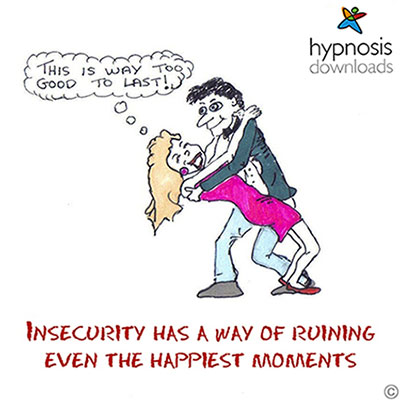Overcoming Insecurity in Relationships
Use these 7 tips to stop feeling insecure about your relationship
"If he's quiet I actually start panicking! I'm thinking: What's he planning? Is he going to finish with me? Has he met someone else? If I don't know exactly where he is I get suspicious. He constantly has to reassure me. What can I do?"
Insecurity spoils relationships. Insecurity drives people to become too 'clingy' or needy and this creates problems.
Feeling insecure in a relationship is natural up to a point, at least until the relationship "settles". Let's look at this in more depth:
Relationships: A security issue
When we enter an intimate relationship we can feel very emotionally vulnerable; especially if we have felt let down or hurt in previous relationships.- Will they reject me?
- Have I done something to upset them?
- This is just too good to last!
Seeing problems where none exist
When we become anxious about anything, we start looking for signs of things 'going wrong' (nervous flyers look out for signs that the aircraft is in trouble). And, of course, we usually find what we're looking for, even if it isn't really there at all.We perform constant monitoring: "Do they look fed up? Why did they say that? Who's this other person they've mentioned? Should I feel threatened? Are they less attentive? Why did they pause after I suggested we meet up?" All this is exhausting.
Emma said she had often felt inadequate and "not good enough" to be with her current partner. She couldn't possibly understand what he could see in her.
She also told me she had ended many previous relationships because of her insecurity. "It felt easier for me to end it before they did!" Walking away rather than risk the pain of feeling abandoned can seem the easiest thing to do. But we all need the comforts and support that intimacy can bring us. So what can you do if insecurity is blighting your relationships?
1) Stop confusing imagination with reality
Making stuff up and then believing it is a sure-fire way to self-torment.The insecure flyer will hear the normal mechanism of the air conditioning and twist it within their imagination to signify impending doom via crash and burn. They'll imagine the bored look on an air steward's face to be barely concealed terror because, "He must know something we don't!" The over-imaginative flyer may even fantasize the sound of the landing gear coming down is an engine falling from the plane. They scare themselves by assuming what they imagine represents reality.
There are normal 'mechanisms' to any relationship. There are ebbs and flows and mood changes, moments of intimacy and closeness and comfortable spaces. These ebbs and flows are normal. Wanting to be absolutely close and intimate all the time is like wanting an aeroplane to never make a sound or a movement.
Next time you feel insecure, ask yourself what it is you are imagining. Write it down on paper under, 'Stuff I am making up in my head.' Being able to distinguish between what you imagine and what is actually happening is a massive step toward self-assurance. Which neatly links to...
2) Avoid the Certainty Trap
Overcoming relationship insecurity is partly about becoming less controlling. This may sound strange, but feeling that: "This relationship must be exactly as I think it should be!" is a form of over-control. A sign of insecurity in relationships is when the desire for certainty becomes too strong.Having to know whether your partner really loves you, having to know this or having to know that puts a lot of unnecessary strain and tension into the relationship. The fact is, we all have to live with uncertainty. Insecure people can still feel insecure even when they are told they are loved. Wanting what is not possible (complete and utter certainty in all and everything forever) is not possible because imagination can still make up doubts. So stop looking for certainty where it doesn't apply.
Self-assurance comes from starting to relax with uncertainty. Wanting to know for certain that someone will be with you forever prevents you enjoying the here and now. Nothing in life is certain.
3) Give the relationship room to breathe
When you plant a seed in the ground, you need to give it access to sunlight, water, and air; you need to give it space to develop. Your relationship needs room to breathe. Schedule in some 'separate time' and just see it for what it is. The developing flower needing space to grow isn't a sign that it is heading for collapse.4) Stop 'mind reading'
Constantly wondering what your partner is thinking is a quick route to anxiety. If they say one thing don't assume they mean another. If they say nothing don't assume that their silence is significant, either.Many men relax by not talking. Constantly wondering and asking what someone is thinking is a dead end because even if they do tell, will you believe them anyway?
'Mind reading' happens when we assume we know what someone is thinking when we don't. When you stop doing it, you really begin to respect someone's privacy because everyone deserves the right to have space to think their own thoughts. Constantly asking, "What are you thinking?" can make someone want to withdraw further.
5) Stop comparing current relationships to past ones
Have you ever taken an instant disliking/liking to someone merely because they reminded you of someone else who you disliked/liked? Some people do this with whole relationships. Because they were in a relationship with someone who was abusive, very critical or dishonest, or who left them, they respond to a new partner defensively or angrily when, in fact, the new partner is not really like the old one at all.The extreme form of this 'sloppy comparison' can lead to destructive over-generalizations such as, "All men are lying bastards!" or "All women are promiscuous money grabbers!"
If you suspect you have been making faulty unfair comparisons between your current partner and a former one, then write a list of all the destructive traits of your former partner. Write next to this list all the ways your current partner is different and review this list regularly. This will help you to stop assuming that the future has to be like the past.
6) For security: Seek self-assurance
Rather than always looking to the other person to make you feel secure in your relationship, get into the habit of reassuring yourself. Start to challenge your own fears and imaginings rather than just accepting them. Ask yourself: "Hold on a second. What real evidence is there for this fear?" At the same time you can focus on the thought: "Okay, nothing in this life is certain and I can live with that. And even if this relationship did end, I'm strong enough to go through it and ride it and will have learnt things from it." We all need to go with the flow in relationships. What we fear will be 'the end of the world' if it happens never really is.Sit down, close your eyes, and strongly imagine feeling relaxed and secure around your partner. This will train your brain to feel that "whatever happens, I'll be okay." Or let me do this exercise for you by clicking on this free audio session below:
7) Focus on the good
Relationships are meant to be fun (at least some of the time). Insecure people look for signs of what's not working. I want you to look for signs of what is.Doing this will get you and your partner feeling naturally more positive.
No meaningful relationship will always totally work all the time. Being too black or white about relationships spells trouble. There are always some difficulties, but keep focussing on what is good.
This doesn't mean that you have to accept anyone who will accept you, even if they are obviously not right for you. But it does mean that if there are occasional problems, you don't have to 'throw the baby out with the bathwater' and become so destructive that the relationship ends or so clingy that your partner ends it for you.
Emma learned to relax and enjoy her relationship. She stopped feeling she had to control what her partner thought or did and her new laidback attitude made it easier for their love to genuinely blossom.
A good relationship is there for you to enjoy together, to share resources and develop together in healthy ways. If someone really does treat you badly or lies and cheats, then feeling insecure is a natural and justified response. However, if you're actually in a generally good relationship, then follow these tips because what you have is precious.
But possibly not as precious as the knowledge that whatever happens, you can relax because you'll be okay.

 "Overcoming Insecurity in Relationships" courtesy of
"Overcoming Insecurity in Relationships" courtesy of
You have such an interesting blog. Thanks for sharing. I'm a life coach blogger. Reading blogs is my hobby and I randomly found your blog. I enjoyed reading your posts. All the best for your future blogging endeavors. Please keep in touch with me in Google+, +sridharchandrasekaran
ReplyDelete